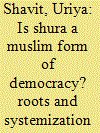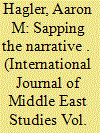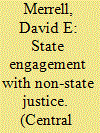| Srl | Item |
| 1 |
ID:
097520


|
|
|
|
|
| Publication |
2010.
|
| Summary/Abstract |
The article examines the contemporary debate in Muslim-Arab scholarship as to the compatibility of Islam and Western democracy. This debate centres on interpretations of shura, or consultation. The article claims that Islam, as a body of texts, traditions and practices, does not favour or reject any specific system of government. Rather, four main theories on Islam and democracy compete for hegemony: a theory integrating some aspects of Western democracy with shura and rejecting others; a theory dichotomizing shura and democracy; a theory contending that shura is democracy; and a theory legitimizing exiting political orders by defining them as manifestations of shura. The article examines the historical roots of each of these theories and analyzes the social-political roles they play.
|
|
|
|
|
|
|
|
|
|
|
|
|
|
|
|
| 2 |
ID:
139913


|
|
|
|
|
| Summary/Abstract |
One mission of Ibn Kathir's Kitab al-Bidaya wa-l-Nihaya fi al-Taʾrikh (The Book of the Beginning and the End in History) is to provide a Sunni answer to a generally ʿAlid-legitimizing corpus of early Islamic historical accounts. Part of the 13th- and 14th-century movement that sought to rehabilitate the image of Syria and the otherwise reviled Umayyad dynasty (r. 661–750), Ibn Kathir's grand work of history cleverly reframes the early Islamic narrative to fit into what he considers a more “properly” Sunni framework than his sources provided. This article focuses on Ibn Kathir's presentation of the shūrā, the council appointed by ʿUmar and charged with choosing from among its six members his successor. It identifies the literary tools Ibn Kathir employed and offers a framework for his strategy of employing them. Whether through narrative aside or criticism of other historians, Ibn Kathir's recasting of a pro-ʿAlid grudge story as an Umayyad apologetic highlights moments of sectarian contention and emphasizes the evolution of Sunni opinion on Ali and Uthman.
|
|
|
|
|
|
|
|
|
|
|
|
|
|
|
|
| 3 |
ID:
097150


|
|
|
|
|
| Publication |
2010.
|
| Summary/Abstract |
Currently there is a question of whether and how Afghanistan should engage non-state councils of elders to resolve disputes. In order to harness their benefits (e.g. efficiency), control their abuses (e.g. occasional controversial resolutions), and stabilize the resolution of disputes, some have argued that formal links should be established between the state judicial system and non-state councils of elders in Afghanistan. Others argue that mere informal links between the two systems should be established. Still others suggest that prior models of state engagement in Afghanistan should be revived. In Kyrgyzstan, just 65 miles north of Afghanistan, the Tsarist, Soviet and post-Soviet administrations have used various methods to engage non-state councils of elders. Despite these vastly different attempts at controlling local dispute resolutions, elders independently resolved disputes outside of Tsarist and Soviet control and continue to resolve disputes outside of post-Soviet state control in Kyrgyzstan. This phenomenon highlights the need for legitimacy in any models of state engagement that are considered for Afghanistan. If, as observed in Kyrgyzstan, people do not use state-sanctioned local councils in Afghanistan, then their purposes may be frustrated. Therefore, in addition to reviewing the experience with state engagement in other parts of the world, policy makers in Afghanistan should also review the historical and contemporary experience with state engagement in Kyrgyzstan. As the need for legitimacy is reconsidered and applied to the design of models for Afghanistan, it may be more likely that those models will be used by more people in Afghanistan and that their purposes will be furthered.
|
|
|
|
|
|
|
|
|
|
|
|
|
|
|
|